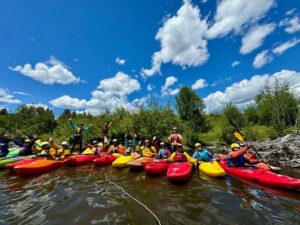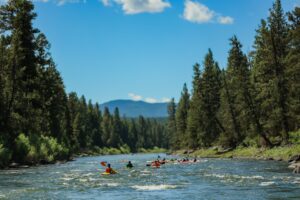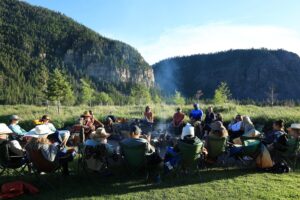Phone: 303.945.2490 Fax: 866.592.6911 Email: [email protected]
621 Kalamath St. Ste 175, Denver, CO 80204
JOIN US FOR A 2025 HEALING ADVENTURE!
For three years in a row, Austin “Cowabunga” Mayeux has raced the Leadville Trail 100 MTB on Team FD, one of our inspiring athletes who not only train to compete, but also raise money — more than $41,000 total so far for Cowabunga — to help young adults dealing with a cancer or MS diagnosis experience the healing power of adventure.
Cowabunga finished the 2024 LT100 MTB race — he shares that “each one was challenging and special in its own way” — with crew support from his wife, Nicole “Shrimp” Mayeux, and the duo also fulfilled their goal of challenging themselves with an FD program experience.
All this riding has been great, but the best thing Nicole and I have done this year is volunteering at a First Descents adventure program in Montana a couple of weeks ago. I’ve written a little something to share our experience.
How we got here: First Descents has provided me entry into the Leadville 100 for the third year in a row, something I’m extremely grateful for. On top of making me the most annoying person my friends and family know, it’s a mental and physical challenge I personally needed and has bled positive impacts into all other aspects of my life. Along with bettering myself, it provides me the opportunity to impact so many others via fundraising for First Descents.
Money is cool and all (please keep donating it), but I felt I owed more to First Descents, and volunteering on one of their programs was the next logical step. After speaking with them and applying last fall, we were selected to work a program on the Blackfoot River in Montana from June 16-22.
As a part of the experience, everyone chooses (or is awarded) an FD Nickname to use in lieu of their “government name.” I chose “Cowabunga.” I found it funny, but also thought it carried a sense of adventure and “diving in.” My goal for the week was to devote (cowabunga) myself fully to the program and participants in hopes I would get back what I put into it (spoiler: I got way more).

During my week, I worked alongside Handstand, a former participant turned volunteer who was an awesome partner and showed me the ropes. We were also supported by lead FD staff members Sweep and Yahoo, our medical volunteer Doogie, and chefs Flow and Dirty. I can’t say enough nice things about this awesome team and hope we get to work together again in the future, but this will be more focused on the participants and what I learned from them.
Shrimp served as the official program photographer. Her main job was to capture the important moments and build a slideshow for the last night. She worked even harder than I did and blew everyone away with the pictures she captured. Those are memories the participants will cherish forever.
I thought I was pretty tough before this trip. I quickly learned that I ain’t sh**. We had 12 people in various stages of their battles with cancer but all are stitched together by one common thread: They are gritty as hell.
Showing up to this program as a participant is a win in itself. You’re flying to the middle of nowhere to spend a week with a bunch of oddly named strangers to try an adrenaline junkie sport for the first time. Most were understandably nervous, and some are still deep in their cancer battle and not physically themselves.
The staff went above and beyond to make the FD program experience work for everyone. One participant (my new hero) was bedridden as recently as a week before and has another surgery coming up right after she gets home. Yet, with every valid excuse available, she made it there and fully participated. She rocks.

It’s Montana … the water is cold. The first boat day is spent learning how to save yourself when the boat flips and you are underwater. If you’ve never seen a whitewater kayak, it’s basically a glorified piece of Tupperware. The cockpit is completely covered by a spray skirt which also locks you into the boat when it inevitably rolls over. You can learn to “roll” the kayak back over yourself using a paddle, but that’s a pretty nuanced skill that takes months to learn.
For our purposes, the participants were trained to tuck their bodies close to the boat when underwater and signal for help flipping over with their hands. If they ran out of air, they had the option of pulling the spray skirt off and engaging an “out-of-boat experience” which comes with its own challenges of getting your boat to shore safely and draining the water from it. I learned this as an overconfident and fearless 19-year-old — and still found it disorienting and scary. It took me much longer than a week to get comfortable. They had THREE days.
Day 1 everyone was certainly hesitant but got in their boats at a small lake and let the guides flip them over … and over … and over … until they got comfortable. I didn’t hear one complaint and saw mostly big smiles coming out of the water. They made a big leap just in the first hour and it only went up from there.
Next we moved to a creek and tested skills on some moving water. A few more people upside down in the water. More smiles coming out of it.
The following two days we got onto the Blackfoot River. Shrimp and I manned the “S.S. Shrimpabunga,” an 18-foot inflatable raft loaded down with everyone’s lunch, a medical kit, and extra gear. It’s beyond me why they entrusted me with this grave responsibility. They probably assumed someone named Cowabunga was willing and able to pilot such a craft. They were half right — and in FD’s spirit of “challenge by choice,” I said yes and did my best. I paddled in the back and Shrimp sat up front and screamed and took pictures and screamed. As my favorite Gen Z participant would word it: She was so strong and brave.

We were joined by an armada of 20 kayaks, including all 12 participants, our guides and staff. The scenery, combined with the crew, made for an amazing two days on the water. We stopped for lunch each day on riverbank beaches and got to watch all the participants challenge themselves on rapids they would have never considered two days before.
Watching their confidence build over the two days was magical. Every single one challenged themselves, made mistakes, and then kept pushing. They were so supportive of each other and bounced back so fast from failures. This was clearly peanuts compared to other challenges they have faced.
The big finish to the kayaking was a long Class II-III rapid right before the takeout. Sweep (who is a professional river guide) gave me some pointers on how to navigate the S.S. Shrimpabunga down it that I immediately botched and put myself in a bad spot. I screamed to Shrimp “hold the (bleep) on, we’re going on an adventure,” fully anticipating the boat to capsize, but we got it sorted out and made it through. I’m not usually an easy scare, but that one really got me.
From there we got to watch the participants all come through the rapid and help them to shore, my favorite moment of the trip. Knowing their individual battles and how they felt only three days before, to see them navigate a challenging rapid solo with the biggest smiles has me tearing up just writing it. As we pulled them in and helped them out of their boats they were BEGGING the guides to drive them back up the river to do it again. This is what FD is all about.
Each night after yet another delicious meal (FD chefs really roll out the red carpet), we had “campfire.” This is exactly what you probably think it is: some kumbaya stuff where everyone talks about their feelings and cries — and it was great. This will fall squarely in “you had to be there” territory, but listening to their stories, watching them build relationships and support each other, gave me some tremendous perspective about problems in my own life that aren’t really problems at all.
Shoutout to all of them for letting us ride along. I didn’t feel like I deserved to be there.
I somewhat understood the medical toll cancer takes on people but vastly underestimated the emotional and mental challenges associated, especially for young people. Many don’t know anyone their age who have gone through it and struggle to find peers. Some received treatment in pediatric units next to infants. Many were told “you’re too young to have cancer” and not given a proper diagnosis for months after experiencing symptoms.
If the illness itself isn’t enough, the experience of just getting the diagnosis plus the care you need can be excruciating in its own way. On top of being scary and facing your own mortality, it’s also isolating. People look at you and treat you differently. The beauty of First Descents is in the community it organically builds through the participants. Everyone there was in various stages of their battles and it built an immediate support community of people they can actually relate to.
Life is NOT fair. Having your life derailed by cancer when you are building your career, starting a family, finding out who you really are is unfair, and none of them should have had to go through it. Having to tell your young children that their parent might die is unfair. Having your aging parents take care of you when you should be taking care of them is unfair.

I’m glad I heard it, but it was gut-wrenching listening to what they all have gone through. They didn’t deserve it, and I’m glad we could provide them any amount of relief, even if it was temporary. All 12 of them are wonderful people, and I’m better for knowing them.
I put undue pressure on myself constantly in all arenas of life. I have a nasty little habit of overcommitting myself: socially (count me in!), professionally (let me know how I can help!), and athletically (**signs up for another race at the finish line of previous race**). This leads to unnecessary stress and missing out on the day-to-day joys of life.
During this week away from it all, being focused 100% on something else gave me some major perspective on what I already have: my amazing wife, my family, a job with excellent people who treat me well, and a body capable of pursuing my passions. If you told me 15 years ago this would be my life right now, I would think I had won the lottery. I’m the luckiest guy on Earth, and will spend more time simply appreciating it.
Giving back in this kind of way is a life cheat code. I spent a week sleeping in a trailer and doing dishes for four hours a day (by far my least favorite chore), and left feeling more fulfilled than I have in years. Funny how that works. Someone told me this week would be “life-changing,” and I assumed it would be (and it was). I also assumed it would be a one-time thing for us. That’s not going to be the case. If FD will have me, I will be back.
While my ability to chase aspirational racing goals will ebb and flow with the demands of real life, the impact I can bring to First Descents via fundraising will remain a major motivator for me. I absolutely love racing Leadville and the training/effort involved, but my “why” had never been deeper than “because I can.” Seeing the impact we collectively had on these 12 people has flipped that upside down. My “why” is now so much deeper knowing the end product of our racing and fundraising.
I’ll leave you with a quote from one of the participants. I believe it perfectly encapsulates 1) what I personally get out of Leadville and, more importantly, 2) what participants get out of a weeklong First Descents trip:
“It might be the greatest honor of the rest of my life that I get to pick and choose the hard things I do for my own satisfaction.” – Fish